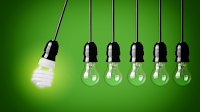Electricity Saving Tips At Home And Alternative Method
 |
| Fig- Electricity Saving |
Electricity saving tips at home
There are numerous tips on home energy conservation, starting from small habits in daily lives to big investments that not only help the environment but also reduce your energy bills. So what are some of the simple tips to reduce energy consumption at home?
Understand your energy bill. The information on a typical energy bill can be confusing, but understanding it can go a long way to helping you get to grips with your energy use at home.
Energy efficiency means you are using less energy to do the same jobs, reducing your home's energy waste and saving money. To effectively increase your energy efficiency involves more than just using less energy - it requires you becoming aware of how energy is used, where it's wasted, and how it can be used more effectively and efficiently in everyday life. Here are some top tips to help your home or business save energy and be more efficient.
💡How to save energy at home?
💡Top alternative energy sources for homes
💡Individual homes can make a difference to the environment
💡Tips to improve the energy rating of your home
 |
| Fig- Bulb |
Light bulb
⌁Use electronic chokes in place of conventional copper chokes.
⌁Take advantage of daylight by using light-colored, loose-weave curtains on your windows to allow daylight to penetrate the room.
⌁Compact fluorescent bulbs are four times more energy efficient than incandescent bulbs and provide the same lighting.
⌁Switch off lights and fans when not required. Optimize use of lights in malls, multiplexes & hotels. De-dust lighting fixtures to maintain illumination.
⌁Use task lighting; instead of brightly lighting an entire room, focus the light where you need it. Turn off the lights when not in use. Replace bulbs with tube lights & CFL(Compact Fluorescent Lamps).
⌁Utilize natural light by using electronic chokes & regulators. Also, decorate with lighter colors that reflect daylight.
Ironing
 |
| Fig- Ironing |
👚Do not iron wet clothes.
👚 Select iron boxes with automatic temperature cutoff.
👚Use appropriate regulator position for ironing.
👚 Do not put more water on clothes while ironing.
Fan
⌁Replace conventional regulators with electronic regulators for ceiling
 |
| Fig- Switch off |
⌁Install exhaust fans at a higher elevation than ceiling fans.
Refrigerator
⌁Make sure your refrigerator door seals are airtight.
⌁Defrost your refrigerator regularly.
⌁Do not open the doors of the refrigerators frequently.
 |
| Fig- Fridge |
⌁Keep adequate space from wall. Set thermostat in medium cooling position.
⌁Leave enough space between your refrigerator and the walls so that air can easily circulate around the refrigerator.
⌁Don't keep your refrigerator or freezer too cold.
⌁Regularly defrost manual-defrost refrigerators and freezers; frost buildup increases the amount of energy needed to keep the motor running.
⌁Do not overload the refrigerator. Do not open door frequently.
⌁Don't leave the fridge door open for longer than necessary, as cold air will escape Use smaller cabinets for storing frequently used items .
⌁Avoid putting hot or warm food straight into the fridge. Cover liquids and wrap foods stored in the refrigerator.
 |
| Fig- Washing machine |
👚Run washing machine only with full load.
👚Use optimal quantity of water. Always use cold water in the rinse cycle.
👚Use after 10 PM or before 10 AM. Always wash only with full loads.
👚Use the correct amount of detergent.
👚Use timer facility to save energy.
👚Prefer natural drying over electric dryers.
👚Use the shortest cycle time.
👚Use hot water only for very dirty clothes.
Water heater
⌁Use before 10 AM. Switch off when not required.
⌁Reduce thermostat setting from 60° to 50° C.
⌁Use Solar Water Heater - a good replacement for a electric water heater.
Mixer and Grinder
⌁Avoid dry grinding in your food processors ( mixers and grinders) as it takes longer time than liquid grinding.
Microwave oven
⌁Consumes 50 % less energy than conventional electric / gas stoves.
⌁Do not bake large food items. Unless you're baking breads or pastries, you may not even need to preheat.
⌁Don't open the oven door too often to check food condition as each opening leads to a temperature drop of 25° C.
Induction cook top
⌁Turn off electric stoves several minutes before the specified cooking time.
⌁Use flat-bottomed pans that make full contact with the cooking coil.
Air conditioner
 |
| Fig- AC |
⌁Use windows with sun films / curtains. Use film / tinted glass on windows.
⌁Clean AC filter every month.
⌁Ensure proper sealing of doors and windows.
⌁Prefer air conditioners having automatic temperature cut off.
⌁The thermostat senses heat from these appliances, which can cause the air conditioner to run longer than necessary.
⌁A roof garden can reduce the load on Air Conditioner.
⌁Leave enough space between your air conditioner and the walls to allow better air circulation.
⌁Seal the doors and windows properly.
⌁The less difference between the indoor and outdoor temperatures, the lower will be energy consumption.
⌁Keep regulators at "low cool" position.
⌁Operate the ceiling fan in conjunction with your window air conditioner to spread the cooled air more effectively throughout the room and operate the air conditioner at higher temperature.
⌁Plant trees or shrubs to shade air-conditioning units but not to block the airflow.
⌁Don't place lamps or TV sets near your air-conditioning thermostat. Set thermostat at 26° C for optimum cooling.
⌁Set your thermostat as high as comfortably possible in the summer.
⌁Don't set your thermostat at a colder setting than normal when you turn on your air conditioner.
⌁A unit operating in the shade uses as much as 10% less electricity than the same one operating in the sun.
Automated devices
⌁Smart automated devices can lower your energy bills even when you forget to. Smart automation systems will detect when you’re no longer using a device and turn off the power supply
Alternative source
Solar panels
Solar panels top the list of the most popular alternative sources of energy that can be used in a home. There are many advances in solar photovoltaic technology and tax incentives to attract more homeowners.
Costs of investing in solar PV has halved in the past decade, so many people are considering opting for solar panels on their roof to generate their own clean and renewable electricity.
Considering that you can power your house with a few panels if you’re looking for a small jump in energy efficiency, solar is a good way to start moving off the grid and consuming a better source of electricity.
Wind turbine
Installing small wind turbines in your home is a great eco-friendly option for those living in places with good wind speeds.
Using wind turbines to generate electricity will greatly depend on where you live.
Geothermal power
Ground source heat pumps provide consistent heating and cooling throughout your house and are durable and efficient, letting you reap their benefits for decades.
Using geothermal power for heating and cooling your home is a much more efficient way of investing into energy efficiency




Comments
Post a Comment